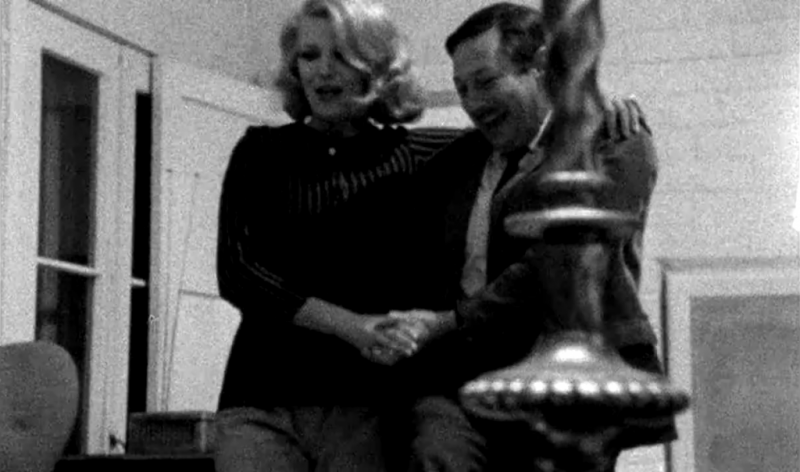On Method Writing
While she’s dressing, Fred serenades her with the lilting “I dream of Jeannie with the light brown hair.” In the midst of his song Jeannie returns, hands poised like sharp flags, almost fending him off, immediately shifting the moment’s seriousness by co-opting his song and making it more playful, less romantic, an echo of her earlier burlesque Russian song about strippers and the “five-year plan.” Her gusto reduces Fred’s take on the song to a barrelhouse stomp complete with staccato vocalizing and leg kicks, “hey, hey.” She and Freddie dance about playfully, but not sexually. Richard, on the outside, cuts in and eventually pushes the song’s tempo back to the lilting quality Fred had originally given it. Jeannie didn’t accept Fred’s “romantic” spin on the song, but she does accept Richard’s same choice. As Jeannie and Richard close in and become intimate, she drops the kittenish tone to her voice, speaking with a much more open sincerity. At one point they no longer sing but hum to one another, and the camera cuts away to Fred, his hands nearly trembling by his mouth, eyes full of hurt and disappointment. He has been upstaged, bested.
These moments surrounding the song are rich in tonal shifts (or emotional levels). How each performer interprets the song’s rhythm and how each actor responds to the choices their fellow actors give spins the scene’s dynamism as new connections emerge and others are broken, thwarted. Fred’s trembling left hand is the most significant tonal shift to this point and drives the impulses of all the choices he will subsequently make. As Jeannie and Richard connect, Freddie becomes more and more desperate, his intentions crueler and darkly disruptive. Sensing his own exclusion from the triangle, he breaks the intimacy with the shocking and crude verbal stab, “By the way, Jeannie. What do you charge?”
In standard Hollywood fare, the next outcome would be two intense people squaring off, but Cassavetes and Rowlands flip the moment. Instead of yelling or slashing back, Jeannie attempts to soften, soothe, and calm Freddie. Rowlands chooses an offbeat, gentle reproach, a different emotional level, the defamiliarized beat. She hugs him and pleads: “Don’t spoil it, Freddie, please.” How many other actors would have yelled or cried or exited the room at this moment? Rowlands’s acting style is syncopated, finding the unexpected rhythms, Sean Penn’s “the uncommon thought in the common matter.”

But Freddie won’t be cajoled: “Spoil what? Honey, I’m game for anything.” Losing ground, he opts for cruder, sharper, and more and more pointed words full of ricochets. His words may be directed at Richard but they’re bouncing off and “hitting” Jeannie. “I know I have to pay . . . What do you think she is? You think she’s some clean towel that’s never been used?” Even as he’s allegedly apologizing, with a faint and flippant “I’m sorry,” he’s aggressive, recalling tipping restaurant busboys and waiters and how, of course, he and Richard will have to tip her too. After all, she’s a prostitute.
In acting terms, Freddie is pressing, pursuing the moment with aggression.
Jeannie answers Fred’s violent ricochets with those of her own. To Richard she confides, “Fred is a very sad man.” Fred objects and Jeannie drops the social graces of her mask and hits back, throwing words overhand, not softly under. “You’re a man that doesn’t say what you mean very well . . . you’re crude.” This tonal shift, combined with Richard’s aggressive threats (“Take your hands off my girl”), breaks Freddie as his body crumbles in on himself. He eventually admits defeat and with resignation and sincerity apologizes abjectly and leaves the room.
Jeannie turns her head away during Fred’s final apology, refusing to fully embrace it.
Choices. There are so many actorly impulses and levels displayed here that make the scene enthralling to watch. Staging, dialogue, gesture provide a host of primal energies as allegiances between Richard and Fred perforate and a new one with Jeannie and Richard is forged. Cassavetes opts for close-up reaction shots: Fred’s trembling disappointment, and Richard and Jeannie looking at each other with collusion during several of Fred’s outbursts, to make us fully present as viewers.
These emotional levels can also be transferred to the page, through an emphasis on beats and objectives.
Recommended
Nor’easter
Post-Op Appointment With My Father
Cedar Valley Youth Poet Laureate | Fall 2024 Workshop





